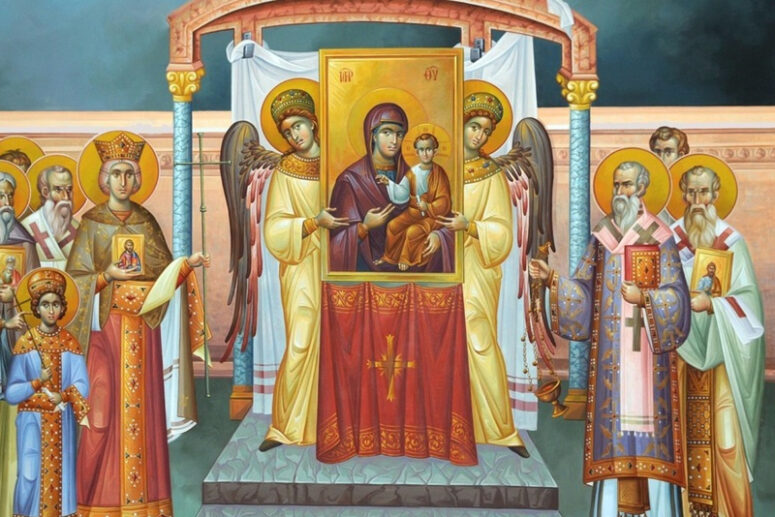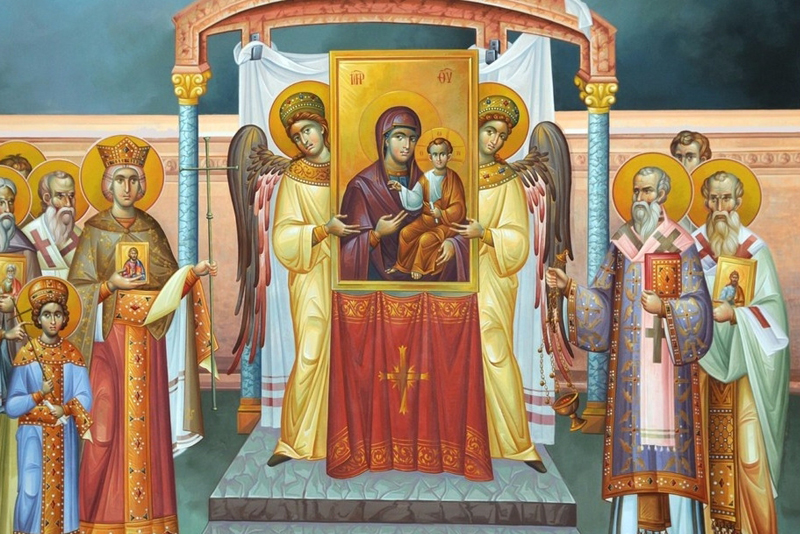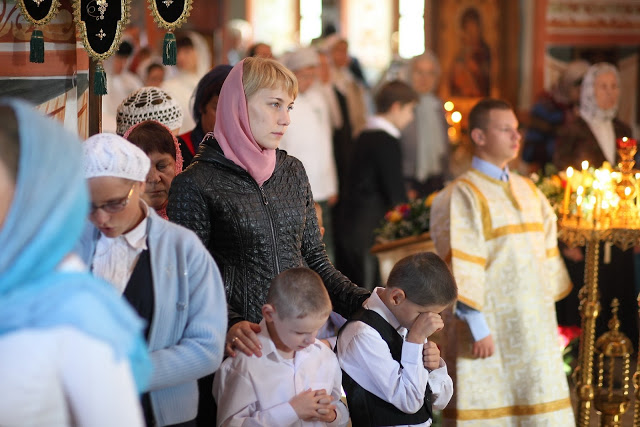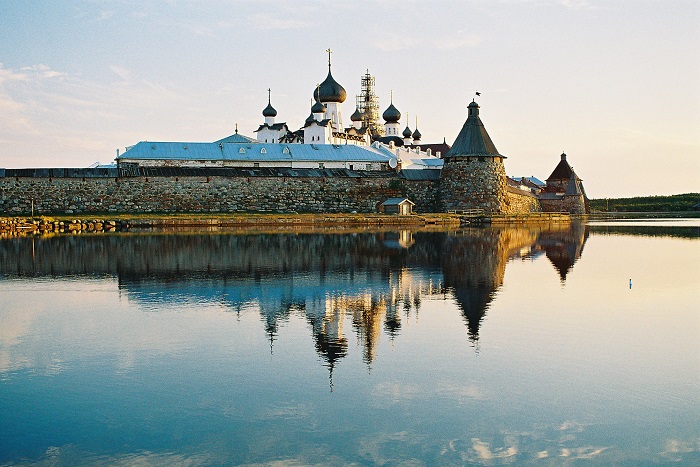
We are gathered here together on the first Sunday of Great Lent to celebrate the Triumph of Orthodoxy. This feast was originally established to commemorate the victory of the venerators of icons over the iconoclasts, but more generally we also commemorate on this day the victory of the true Orthodox faith over all the heresies that have challenged it throughout history.
There is an interesting fact which we easily overlook about this feast: the original Triumph of Orthodoxy, the triumph of the veneration of icons, was not only a victory in a battle waged within the Church, but also within society and the entire Byzantine Empire at large. You see, when the final victory of the holy icons occurred, the Seventh Ecumenical Council was long over, the bishops had already decreed that the icons are a holy and necessary part of our faith. It was rather the iconoclast emperors who had continued to resist; therefore the Triumph of Orthodoxy was not only a theological triumph, but also a political triumph.
I mention this fact because it stands in such sharp contrast to our own world today: we have come to assume that our Christianity is, by and large, a strictly private affair. We do not generally think of our faith as something appropriate to bring openly into public life. And we especially become nervous at any mention of theology or dogma around those who do not share our faith: this subject seems just too contentious, too divisive, and also rather unnecessary and perhaps a bit embarrassing. We have come to believe that society is better off without such things, that we will all get along much better if we simply leave those things in the privacy of our own homes and churches.
Such a view of religion and society, the “separation of church and state,” is a quite recent phenomenon and totally unique in human history. It would take too much time to get into the political, philosophical and historical causes behind this idea, but suffice it to say that it is almost universally believed today by everyone, Christians and atheists alike.
But is it true? Despite the great syncretist goal on which America was founded—E Pluribus Unum, “Out of the Many, One”—we now watch as our country daily grows ever more divided by class, race, culture, and ideology. Our national discourse is plummeting—indeed, has plummeted—into an abyss of vitriol, hostility, bitterness and resentment. Meanwhile, our schools are no longer safe places to send our children; divorce and abortion have become ever-present facts of life; depression and anxiety are the norm; and modern life has become so meaningless, so unbearably empty, that drug overdose is now the leading cause of death in Americans under fifty. Religion in general and Christ in particular have all but vanished from public life all across the world; yet the dream and promise of a peaceful and enlightened secular society, grounded in shared ideals of humanism, is nowhere to be found. Certainly this has not been for lack of effort; indeed, the history of the past several centuries reads like a catalog of failed attempts to create such a society.
But the reality is that this society does not and cannot possibly exist. Christ said: “I am the Way, the Truth and the Life.” How can we think to create a good and healthy society that does not follow the Way, is not founded on the Truth, and does not seek to bring Life to all its people? For as St. Paul writes: “other foundation can no man lay than that is laid, which is Jesus Christ” (I Cor. 3:11).
So what am I saying, that we ought to unify society by forcibly creating a theocracy, at the edge of the sword? Of course not. But what I am saying is that we must, above all else, unify our own hearts. We cannot continue to divide our lives into career, family, politics, entertainment, and over there in one small corner our Christianity. Our faith is not something to take out and look at for an hour on Sunday mornings, and then put back away again safely for another week. Such a faith is no faith. It is only a lifeless idol; it cannot save us, and it cannot save those around us.
And the world today desperately needs our Holy Orthodox Faith. It is the pearl of great price, worth far more than all the treasures in all the world put together. It is only Christ and His Holy Church that can heal the spiritual sickness and existential pain that we see all around us every day. But the plain fact is that the people around us, in all likelihood, have precisely one chance of ever finding the Church: through us. Through the witness of our daily lives. As someone once said: Christians should live in such a way that, if Christ had not been raised from the dead, their lives would be absurd.
Of course, we must use discernment. We cannot force our faith on others, we cannot bring healing to those around us by relying upon arguments and contentions and debates. There will probably be times when we are called upon to preach the faith directly, but most of our lives are actually a preparation for such times. Most of the time, we are called simply to be Christians in every place and at every moment of our lives, without exception. And that means to begin and end every day with prayer. It means to pray as much as possible throughout the day, and to pray openly with the sign of the Cross before and after meals, whether at home or in public. It means not to watch anything that you would be ashamed to watch with your children or your priest. It means to seriously keep each one of the fasts. It means to attend church as often as you can. It means to go regularly to confession, repenting sincerely of all the things in your life that keep you from God. It means to never, ever say an unkind word about anyone, whether openly or behind their back. It means to always put everyone before yourself. It means to make real, meaningful sacrifices for those in need, especially strangers and the poor. It means to forgive everyone for everything, all the time and no matter what. It means to never judge another human being for anything whatsoever. It means to thank God sincerely for every single thing in your life, even the things that are the most unpleasant, confusing and painful. It means to trust God totally, and to obey Him completely. In short, it means to die to everything in this world, to take up whatever crosses God may send you, and to follow Him.
Perhaps you might think that this sounds a bit unrealistic, suitable maybe for monks but beyond what God expects of people living ordinary lives in the world. If so, then I suggest a very simple and purely scientific experiment: just try it. Try this Lent to remember Christ all the time, to really love Christ with every thought and word and action. Try really keeping the fast. Try going without impure and frivolous entertainment. Try praying like it really, really matters. Try giving up things that you want for the sake of those around you. Try being the kindest to the people that you like the least. Try to really live as though all the pleasure and honor and possessions and prestige that this life can offer mean absolutely nothing in comparison with eternity. Try living like you could die tonight. And then see—even if you don’t do a very good job of it—whether your life doesn’t become better. See whether your life doesn’t become fuller and not emptier, richer and not poorer, more joyful and not more dull. I’m not saying that it will be easy. But I promise you that it will be worth it.
Because God, Who is our loving Father, never gives a single commandment that is not solely for the sake of our own eternal joy and happiness. He really does know better than we do what is good for us; but we must discover this fact for ourselves, in actual experience in our own lives. We must be willing to take the risk of believing God. But despite our fears, every sacrifice we make to God is never, ever something that we lose. He always gives back the gift a thousandfold, and we always find ourselves infinitely richer and not at all poorer for having made the sacrifice. After all, God does not need Lent. We do. And so do all the people around us, because as St. Seraphim of Sarov said: “Acquire the Spirit of Peace, and a thousand souls around you will be saved.”
And once we begin to live in this way, once the Holy Spirit begins His work of transformation and deification in our hearts, then and only then we will be able to speak to others of the holy truth of our faith. Because then and only then will anyone have a reason to listen. The world will never know Christ if we never speak openly of Him; but if the world does not see Christ in us, if it does not meet Christ in us, then in all our talk they will know us for what we truly are: Pharisees and hypocrites. But though they will know us, they will not know Christ. How sad it is, how shameful it is, that so many living in the world today have known only these two types of Christians: those who are silent about their faith, and those who are hypocrites.
Let us then sincerely repent of these two great sins. Let us learn with the help of God to become true Orthodox Christians. Let us pray fervently to the Lord, and let us all strive to acquire the Holy Spirit in every aspect of our lives during this Lenten fast, so that not only we but a thousand souls around us will be able to experience together the supreme and incomparable joy of the Lord’s Pascha, both now and in the eternal kingdom which is to come. May God grant us this, through the intercessions of the Most Holy Theotokos and of all the saints. Amen.




